
No. 2, 2025 | 13 February 2025
Go to:
From FRSA's Executive Director
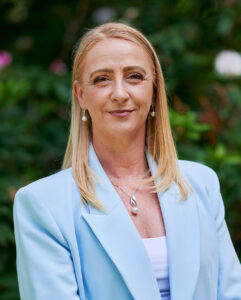
Earlier this week I had the privilege of meeting up with the young people who will be speaking on the Young People’s Panel on ‘What makes a difference when working with young people’ at the CIP Forum in Canberra. Their generosity of spirit is both immense and intense. Whilst their respective journeys and personalities are distinctly different, they do share the bond that having lived a life where they were often let down by the adults around them brings. Yet they were all willing participants in the conversation and the upcoming panel because they are motivated by the unselfish intention to do whatever they can to ensure that other young people who find themselves in situations such as theirs don’t have to go through what they went through. Each of them is powerful, persuasive and passionate and I want to extend my thanks to local youth workers/coordinators Hannah, Zakia, Daniel, Kayla and Dot for introducing me to these incredible young people and helping me bring this lived experience panel to life. If you are coming along to the CIP Forum next week, I am looking forward to seeing you – as are all the FRSA staff who will be there.
FRSA’s submission to the DSS Review of Children, Youth and Parenting Programs – Discussion Paper is available on our website. My thanks to our members who engaged in our consultation processes to help inform FRSA’s contribution to the Departmental Review. We also made a brief contribution to the Federal Government’s pre-budget submission process, which is also available on our website.
Just a reminder that our FRSA Conference 2025 registrations are open. Don’t forget about the pre-Conference workshops that have been extremely well attended over the last couple of years. We have mixed things up a bit this year with a slight shift in subject matter being presented by AIFS. Our First Nations workshop is being delivered this year by Gawura Cultural Immersions, which is headed up by former network member Stuart McMinn. Stuart is helping us out with a number of cultural activities during the Conference and we can’t wait for the opportunity to be working with him and his team.
Kind regards,
Jackie Brady
FRSA Executive Director
FRSA’s new postal address
We have updated our postal address, please see below to update your records:
✉️PO Box 329 Curtin ACT 2605
Child Inclusive Practice Forum 2025 NEXT WEEK!
Next week on 18-19 Feburary is the Child Inclusive Practice Forum 2025 in Canberra. It’s set to be a fantastic two days and we’re excited to announce the final panel discussion for the Forum, What makes a difference when working with young people – a young people’s panel.
When children and young people come into contact with a range of service systems, adults are making decisions about important aspects of their lives. We will be joined by a number of young adults who were involved in a range of services systems when they were younger. They have been asked to share with us their experiences during that time with a particular focus on when they were or were not heard – and their experiences – good and not so good. The voices of our panellists on their respective lived experiences will shed light on the practices that matter and can make a difference when working with young people.
The panel will be moderated by Zakia Patel from Multicultural Hub Canberra & Regional NSW. We look forward to a great event!
Child Inclusive Practice Forum 2025 Gold Sponsor: Uniting Counselling and Mediation
 Uniting Counselling and Mediation (NSW) is genuinely excited to be a sponsor of the Child Inclusive Practice Forum, 2025, with our commitment to an increasing inclusion and understanding of the place of children’s voices in decisions impacting them. Using a Family Systems approach, we have learned that directly listening to young clients can profoundly influence parents’ entrenched positions, challenge family assumptions, and shift perspectives on what children say they need.
Uniting Counselling and Mediation (NSW) is genuinely excited to be a sponsor of the Child Inclusive Practice Forum, 2025, with our commitment to an increasing inclusion and understanding of the place of children’s voices in decisions impacting them. Using a Family Systems approach, we have learned that directly listening to young clients can profoundly influence parents’ entrenched positions, challenge family assumptions, and shift perspectives on what children say they need.
We recognise that child consultation is particularly valuable for the children themselves, where it allows them to express their views, ensures that an adult advocates for their needs, and provides a response to their distress. For this reason, we consistently consult children when working with separated parents, particularly in cases involving high-conflict and when child safety concerns such as domestic and family violence or abuse are present.
Building on our commitment to listening to children’s voices, we have heard that many preferred engaging online and learned some would not have accessed support if not for Online CIP which we now offer, especially to adolescents.
Children tell us that they want to participate in their communities and give feedback about services that are designed for them, like SCASP. As a result, we created a child feedback tool aligned with the DEX SCORE framework, enabling us to hear directly about their goals and circumstances.
Finally, we have been actively embedding the National Child Safe Organisation Principles across our services. We are increasingly providing child-friendly information about their rights and participation and we also started 2 Youth Advisory groups in 2024 where young clients can share their insights on Uniting’s processes.
By continuously refining and expanding our approach, we strive to ensure that children’s voices are not just heard but meaningfully acted upon in our Family Law services.
Conference branding launched!
FRSA is excited to share our official branding for the 2025 National Conference on 19-22 May 2025 at the Sheraton Grand Sydney Hyde Park. The design reflects the Conference theme, Safe, Strong and Thriving.The icons represent the following:
- PADLOCK: Safety
- HEART: Strength
- LEAF: Thriving
The base shape symbolises a folded leaf or cup and illustrates how these icons are interconnected, offering a cohesive representation of a meaningful gift to the recipient. We believe this concept best represents the Conference theme and effectively captures its core message.
Stay tuned for more announcements in the lead up to the Conference including the Gala Dinner venue, Keynote speakers, panellists and more! In the meantime, don’t miss out on saving up to $200 per person with early bird registration rates ending Monday, 3 March 2025.
Bursary Program
Two bursaries are available for Aboriginal and Torres Strait Islander people who are registered for or would like to attend the 2025 Family & Relationship Services Australia National Conference.
Bursaries are provided to assist with covering the cost of conference registration, and travel & accommodation. To be eligible you must be an employee of a fully financial FRSA member organisation. Each package includes:
- 1 x Complimentary full registration to the Conference (including dinner)
- $500 towards travel and accommodation
Applications closes on FRIDAY, 28 March 2025.
DSS Review of Children, Youth and Parenting Programs – FRSA submission
FRSA has lodged its submission to the Department of Social Services (DSS) consultation on the Review of Children, Youth and Parenting Programs Discussion Paper. This consultation has now closed.
Three programs, which are delivered by FRSA Members, were included in the review – Children and Parenting Support, Family Mental Health Support Services and Communities for Children Facilitating Partner.
FRSA sees a vital role for prevention and early intervention programs in the broader social service system. The evidence from the department’s review shows that children, youth and parenting programs are well placed to contribute to positive improvements in the lives of children, young people, adults and families. At the same time, there are a number of broader social and economic pressures that lead to high levels of disadvantage and vulnerability across Australian communities. This cannot be ignored. In the absence of sufficient financial and housing supports, and affordable tertiary and clinical services, providers of early intervention services need to be adequately resourced and equipped to meet client complexity.
Our thanks to FRSA members who participated in our online consultations in January.
FRSA’s submission is available on our website.

Supporting Young Men Online: Understanding young men’s needs, the pull of harmful content and the way forward report
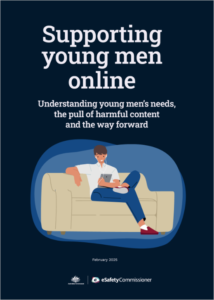 The eSafety Commissioner has released the second report in a two-part series that set out to investigate young men’s unique online experiences, including how they form and express their identities online.
The eSafety Commissioner has released the second report in a two-part series that set out to investigate young men’s unique online experiences, including how they form and express their identities online.
In part one, they heard from 117 young men about their experiences, beliefs, behaviours and influences in online spaces. For part two, they conducted in-depth interviews and a research workshop with 16 expert practitioners.
These practitioners reflected on the (often overlooked) resilience and capacity of young men to navigate an increasingly complex and fraught online environment, as well as factors that can contribute to their susceptibility to harmful online narratives rooted in narrow ideals of masculinity.
Key findings – based on the experiences of the young men (Part 1) and practitioners (Part 2) involved:
- Being online can be positive for young men, allowing them to express themselves, connect socially and develop their critical thinking skills.
- Young men are interested in learning how to become good, kind men, and can be empathetic and think critically.
- Young men feel defensive, disenfranchised, uncertain, rebellious and lonely.
- Harmful online content, creators and communities can appeal to young men by meeting their needs for validation, guidance, edginess and belonging.
- Algorithms and recommender systems push harmful content onto young men.
Call to raise income support
Parliamentarians, including many members of the crossbench, have joined community sector leaders in calling on the parliament to raise the rate of income support.
Currently JobSeeker is just $56 a day and Youth Allowance just $47 a day. Both rates are less than half the minimum wage and leave people unable to afford basic necessities such as rent, food and medicine.
ACOSS has stated in its Raise the Rate Campaign, that we need to raise the rate of Jobseeker and other income support payments to at least $82 a day so everyone can keep a roof over their head and food on the table.
FRSA Members continue to report that clients are increasingly presenting for family and relationships services while also experiencing housing and income stress. In many cases, financial and housing stress is itself placing pressure on families and relationships, generating family conflict and breakdown. When basic needs are not met, the flow-on effects can be profound, resulting in multiple health and social problems and increased need for social and health supports.
FRSA has therefore supported ACOSS’ call to raise the rate to at least $82 a day in our Pre-Budget 2025-26 submission, which we recently submitted to the Treasury.
National Youth Week and the National Youth Forum
Around 100 young people from across the country were in Canberra last week – National Youth Week – to work with the Australian Government on issues that affect them and their communities.
The week included the second annual National Youth Forum, where young people come together to work on policy ideas across the theme of ‘regional, rural, and remote’. Attendees will focussed on building drought resilience, involving young people in disaster preparedness and response, and getting more regional, rural and remote young people into tertiary education.
National Youth Week is a celebration of young people (aged 12–25) throughout Australia. It is a joint initiative of the Australian, State and Territory Governments.
Ombudsman investigation into Targeted Compliance Framework
The Commonwealth Ombudsman, Iain Anderson, announced last week that they have commenced an investigation into the Department of Employment and Workplace Relations and Services Australia’s cancellation of income support payments under the Targeted Compliance Framework (TCF).
Running since 2018, the TCF is the mechanism by which participants’ income support may be suspended, reduced or cancelled. The Australian Council of Social Service (ACOSS) made a complaint about the Federal Government’s administration of its Targeted Compliance Framework to the Ombudsman in December following the revelation that around 1,000 income support payments may have been illegally cancelled in the period between April 2022 and July 2024.
FRSA looks forward to seeing the outcome of the investigation.
Investing in Early Childhood Education and Care – OECD Report
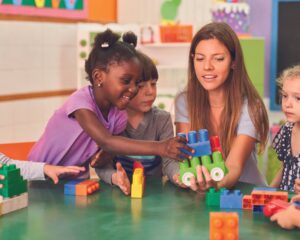 The OECD has published a report – Reducing Inequalities by Investing in Early Childhood Education and Care – which discusses the drivers of inequalities in early childhood and the place of Early Childhood Education and Care (ECEC) within the landscape of mitigating policies.
The OECD has published a report – Reducing Inequalities by Investing in Early Childhood Education and Care – which discusses the drivers of inequalities in early childhood and the place of Early Childhood Education and Care (ECEC) within the landscape of mitigating policies.
The report presents a new policy roadmap to improve equity and inclusion in the sector, and provide lasting benefits for economies and societies. Recommendations focus on combining universal and targeted approaches and aligning ECEC with broader early years policies.
A concerning finding of the report is that Australia has the highest proportion of families (more than 85%) paying childcare and early learning fees to for-profit companies of any OECD country.

Parliamentary Inquiry into Family Violence Orders – report tabled
The Australian Parliamentary Standing Committee on Social Policy and Legal Affairs has tabled the report on its Inquiry into family violence orders.
On referral from the Attorney General on 4 June 2024, the Committee was asked to inquire into how to provide better access for victim-survivors in the family law system to Family Violence Orders (FVO) and the effective enforcement of those orders.
The committee has recommended:
- Harmonising definitions of family, domestic and sexual violence, and encouraging consistent FVO laws and police responses
- increasing the capacity of the Federal Circuit and Family Court of Australia to identify, respond and expedite high-risk family violence and child abuse matters
- making court appearances safer
- making proceedings more accessible and providing more support to people with low English and/or digital literacy or who are living with disability, to First Nations and culturally and linguistically diverse people, and to Australians who live outside of the major cities
- improving the capacity of the family law courts to make orders for the protection of victim-survivors, known as personal protection injunctions
- piloting a children’s advocate role to help ensure children are protected and their views are represented safely
- eliminating opportunities for systems abuse
- ensuring that police, the judiciary and legal professionals have a deep understanding of the nature and dynamics of family, domestic and sexual violence, including coercive control, and how systems can be used to perpetrate further abuse
- exploring a single advocacy support model for victim-survivors.
FRSA lodged an initial submission and a supplementary submission to this inquiry, and gave evidence to a public hearing in August last year.
Mental Health and Suicide Prevention Agreement Review
 The Productivity Commission (PC) has been asked by the Australian Government to conduct the final review of the National Mental Health and Suicide Prevention Agreement.
The Productivity Commission (PC) has been asked by the Australian Government to conduct the final review of the National Mental Health and Suicide Prevention Agreement.
The review will assess the impact of programs delivered under the Agreement and make recommendations for the Agreement that aim to enhance the effectiveness, accessibility, affordability and safety of the mental health and suicide prevention system.
The PC will soon put out a call for submissions. It will set out some of the issues and questions the Commission has identified as relevant at this early stage of the inquiry. Participants should provide evidence to support their views, including data and specific examples where possible.
The PC will seek further information and feedback following the expected release of an interim report in June 2025, with the final inquiry report to be completed by 17 October 2025.
You can find more information here.
Australian Government funding announcements
The Albanese Government has announced that 42 projects across Australia will receive a share of $100 million building hundreds of new crisis and transitional homes for thousands of women and children impacted by family and domestic violence, and older women at risk of homelessness.
Funded under the Housing Australia Future Fund (HAFF), the Crisis and Transitional Accommodation Program (CTAP) funds the building, remodelling or purchase of new or expanded crisis or transitional accommodation.
More information about the Crisis and Transitional Accommodation Program and the Safe Places Program is available from the Department of Social Services website.
Report on Government Services 2025
The Productivity Commission has released its annual Report on Government Services. The report provides information on the equity, effectiveness and efficiency of government services in Australia.
The report contains five parts:
- Part A Approach to performance reporting
- Part B Child care, education and training (includes early childhood education and care, school education, vocational education and training)
- Part C Justice (includes police, courts and corrective services)
- Part D Emergency management (includes fire and other emergency events)
- Part E Health (includes primary and community health, ambulance services, public hospitals, services for mental health)
- Part F Community services (includes aged care, disability, child protection and youth justice)
- Part G Housing and homelessness
The report is available on the Productivity Commission website.
Government response to committee report: Family Law Amendment Bill 2024
The Australian Government has tabled its response to the Senate Legal and Constitutional Affairs Legislation Committee report: Family Law Amendment Bill 2024.
The Bill is the second tranche of legislation which aim to make the family law system safer and simpler for separating families. The Family Law Amendment Bill 2024 was passed in Parliament with amendments on 28 November 2024 and the bulk of changes will come into effect on 10 June 2025 including changes to the property framework:
- how the family law courts will determine a property settlement
- what the family law courts will consider when determining a property settlement. This includes the economic effect of any family violence, where relevant.
FRSA supports many of the changes, however, we are disappointed that the Government has elected not to strengthen provisions around Protected Confidences (Schedule 3, Part 5) to better protect clients from harm. Our submission to the Committee’s inquiry is available here.

Post-Separation Parenting App Information
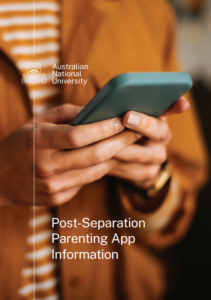 The research team from the Australian National University, Relationships Australia Canberra and Region, Relationships Australia Victoria, and Relationships Australia NSW has finalised a resource on post-separation parenting apps.
The research team from the Australian National University, Relationships Australia Canberra and Region, Relationships Australia Victoria, and Relationships Australia NSW has finalised a resource on post-separation parenting apps.
The aim of the research was to help separated parents and family law professionals make evidence-informed decisions about which smartphone app or app feature(s) will help maximise positive communication and/or minimise opportunities for conflict for different family types and situations.
This resource describes some of the most popular parenting apps available in Australia, and sets out important considerations for choosing an app or app feature. Find out more.
Australia Day Honours
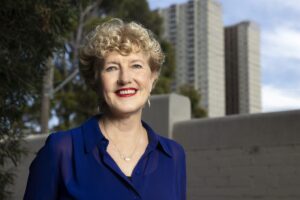 Congratulations to MacKillop Family Services’s CEO, Dr Robyn Miller, who was awarded an Order of Australia (AM) for her significant service to children, young people and families.
Congratulations to MacKillop Family Services’s CEO, Dr Robyn Miller, who was awarded an Order of Australia (AM) for her significant service to children, young people and families.
Relationships Australia Canberra & Region opens new headspace centre
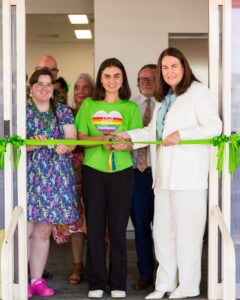 Relationships Australia Canberra & Region recently held the official opening of their new headspace Wagga Wagga centre.
Relationships Australia Canberra & Region recently held the official opening of their new headspace Wagga Wagga centre.
They were joined by members of the Youth Reference Group, Dalal and Chelsea and doors were officially opened by Senator Deborah O’Neill. The new centre has been designed by young people, for young people. Read more.

Act for Children campaign - Town Hall
 National Children’s Commissioner, Anne Hollonds is hosting an online Town Hall meeting on the Act for Children campaign on Friday, 21 February 2025 at 12:30pm-1:30pm.
National Children’s Commissioner, Anne Hollonds is hosting an online Town Hall meeting on the Act for Children campaign on Friday, 21 February 2025 at 12:30pm-1:30pm.
The meeting will update on progress of the campaign, and discuss actions to take in coming months. Join the meeting via this Microsoft Teams link.
The aim of the campaign is to call to on all governments to make child safety and wellbeing a national priority in Australia. Visit the Act for Children website to find out more about the campaign.
HESTA Excellence Awards
 The HESTA Excellence Awards recognise exceptional achievements in a range of settings across aged care, allied health, community services and disability services. There are so many exceptional professionals in health and community services making a huge impact.
The HESTA Excellence Awards recognise exceptional achievements in a range of settings across aged care, allied health, community services and disability services. There are so many exceptional professionals in health and community services making a huge impact.
Survey extended: Towards an Australian Response to the use of Intimate Partner Violence by Young People
Australian Institute of Family Studies (AIFS) has extended the closing date until the end of February for the survey on the use of intimate partner violence by young people.
This project aims to build understanding of the extent to which young people’s use of intimate partner violence (IPV) can be understood as distinct from adult-perpetrated violence, and how services and agencies across Australia are responding to this cohort.
Read the participant information sheet and/or complete the survey.
Listening Together Research Project
Researchers at the Australian National University are studying how young people with disability and young carers define good listening, and whether they feel listened to by the organisations and services in their lives. The project is co-designed with a group of young people with disability and young carers.
Young people with disability and young carers are invited to take part in the research by doing an online survey. The survey is open until June 20th 2025. Find out more.
Who supports you to raise your children? Research interviews
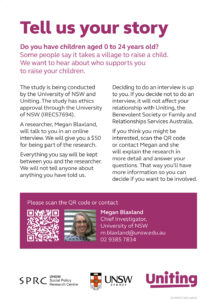 The University of NSW and Uniting are conducting a study about the supports people receive to raise their children and are seeking interview participants to tell their story. All interviews will be confidential and participants will receive $50 for being part of the research.
The University of NSW and Uniting are conducting a study about the supports people receive to raise their children and are seeking interview participants to tell their story. All interviews will be confidential and participants will receive $50 for being part of the research.
You can find out more here.
Effective Online Group Leadership Workshop
SUNSHINE CIRCLES – Albury
SUNSHINE CIRCLES – Shepparton
HEY LITTLE WARRIOR – Sale
Webinar: Navigating Australia’s Child Safe Legislation | 4 March 2025, 12pm – 1:30pm AEDT | The National Centre for Action on Child Sexual Abuse
Equip yourself with the critical knowledge needed to navigate the legal and legislative requirements and environment when working with and supporting victims and survivors of child sexual abuse.
Ideal for practitioners from diverse organisations and settings who work with children and young people, the session will explore the complexities of legal foundations and reporting protocols across different jurisdictions.
NSW
Support worker (Family and Relationship Services) | CatholicCare Wilcannia-Forbes
Educators – Outside of School Hours Care | Centacare Central West and Orana
Group Facilitator – Men’s Behaviour Change | Relationships Australia NSW
Caseworker & Group Facilitator – Men’s Behaviour Change | Relationships Australia NSW
QLD
Family Dispute Resolution Practitioner | UnitingCare Community
Family Dispute Resolution Practitioner – Rockhampton | CatholicCare Central Queensland
VIC
Policy & Advocacy Assistant | Better Place Australia
NT
Financial Capability Worker | Anglicare NT
Senior Human Resources Advisor | Anglicare NT
If you have any events you’d like listed on the FRSA Events and Training Calendar or job vacancies you’d like listed on the FRSA Jobs Board, email Communications Officer, Vanessa Lam at communications@frsa.org.au. Please note that posting onto the FRSA website is reserved for FRSA Members only.

Australia’s disability strategy 2021–2031 outcomes framework: third annual report | Australian Institute of Health and Welfare
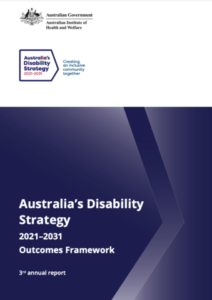 An overview of the progress made on outcomes for people with disability in 2024. The framework covers seven outcome areas: employment and financial security, inclusive homes and communities, safety, rights and justice, personal and community support, education and learning, health and wellbeing, and community attitudes. It shows mixed outcomes, with an equal number of measures improving, unchanged and worsening.
An overview of the progress made on outcomes for people with disability in 2024. The framework covers seven outcome areas: employment and financial security, inclusive homes and communities, safety, rights and justice, personal and community support, education and learning, health and wellbeing, and community attitudes. It shows mixed outcomes, with an equal number of measures improving, unchanged and worsening.
Summary report of the 2022 Australian Defence Force Families Survey | Australian Institute of Family Studies
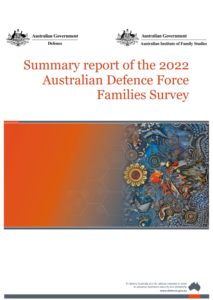 This new report draws on data from the Australian Defence Force (ADF) Families Survey – the primary Australian survey capturing experiences of service life, and support and service needs, directly from families of Defence personnel. With more than 2,800 families participating in the survey, the report will inform policy and practice to support the critical role of families in the wellbeing of ADF members and veterans.
This new report draws on data from the Australian Defence Force (ADF) Families Survey – the primary Australian survey capturing experiences of service life, and support and service needs, directly from families of Defence personnel. With more than 2,800 families participating in the survey, the report will inform policy and practice to support the critical role of families in the wellbeing of ADF members and veterans.
Practicing at the intersection of child sexual abuse and domestic violence | National Centre for Action on Child Sexual Abuse
The National Centre recently hosted an In Conversation webinar, bringing together insights from research, cultural and practice experts and lived experience to explore the intersection of family violence and child sexual abuse. Following this important discussion, we asked one of our panellists, Dr Morag MacSween to share her thoughts on some of the considerations raised during the discussion and what this means for practitioners and others working in this space.
Evaluation of Victoria Legal Aid’s specialist family violence courts legal practice model | RMIT University
An evaluation of the legal services set up to support Victoria’s first five specialist family violence courts demonstrates the important role that holistic legal assistance plays in addressing gender-based violence in Australia. The evaluation provides evidence of the effectiveness of legal services at these courts and their value as an integral part of the family violence prevention and response system.
National Aboriginal and Torres Strait Islander suicide prevention strategy 2025–2035 | Department of Health and Aged Care
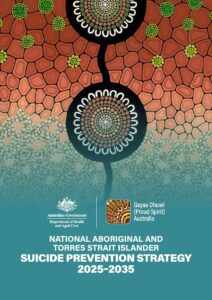 The strategy sets out a vision for a future where Aboriginal and Torres Strait Islander people enjoy high levels of social and emotional well-being and have access to culturally safe and responsive mental health services. The strategy identifies six priorities to empower Aboriginal and Torres Strait Islander communities and support their leadership in suicide prevention.
The strategy sets out a vision for a future where Aboriginal and Torres Strait Islander people enjoy high levels of social and emotional well-being and have access to culturally safe and responsive mental health services. The strategy identifies six priorities to empower Aboriginal and Torres Strait Islander communities and support their leadership in suicide prevention.
Measuring social connection | Swinburne University of Technology
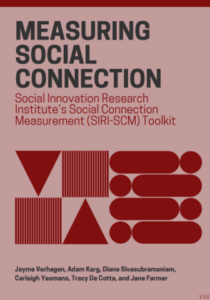 This toolkit provides an overview of social connection and describes a process of measurement development. It will allow practitioners to understand the dimensions of social connection and how social connection relates to outcomes of personal wellbeing, deploy the measurement tool and compare the average results from their own data collection to results from nationally representative samples.
This toolkit provides an overview of social connection and describes a process of measurement development. It will allow practitioners to understand the dimensions of social connection and how social connection relates to outcomes of personal wellbeing, deploy the measurement tool and compare the average results from their own data collection to results from nationally representative samples.
Relationship and family circumstances of current and ex-serving Australian Defence Force members | Australian Institute of Family Studies
This latest research from the Australian Institute of Family Studies shows that women serving in the Australian Defence Force (ADF) are far less likely to be in a relationship than serving men. This snapshot draws on the 2021 Australian Census to examine the relationship and family circumstances of current and ex-serving Australian Defence Force members and how they differ from the circumstances of those who have never served.
Building resilience in children and young people | Australian Institute of Family Studies
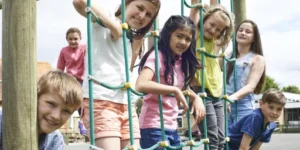 This resource describes good practice in community-based group counselling for building resilience in children and young people aged 7–20 years. It also provides insights on prevention and mental health promotion interventions effective in increasing children and young people’s resilience.
This resource describes good practice in community-based group counselling for building resilience in children and young people aged 7–20 years. It also provides insights on prevention and mental health promotion interventions effective in increasing children and young people’s resilience.
Artificial intelligence and child sexual abuse | Australian Institute of Criminology
This study describes the state of current research at the intersection of artificial intelligence (AI) and child sexual abuse (CSA). It examines the uses of AI for the prevention and disruption of CSA, and the ways in which AI is used in CSA offending. An evidence gap map is provided to guide future research.
Supporting infants and children in disasters: A practice guide | Emerging Minds
This practice guide is a series of resources on child-centred and family-focused approaches in disaster preparedness, response and recovery. It aims to equip practitioners with foundational knowledge and evidence-informed approaches to support infants, children and their families who experience disasters.
These resources have been created to support practitioners across a wide range of sectors, including health services, social and community services, education, first response and emergency services, government, non-government organisations, and community-led initiatives.
Rewarding renters: how the Commonwealth can make renting easier and fairer for all Australians | The McKell Institute
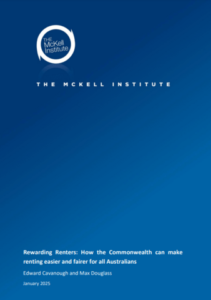 The rental crisis is now of national scale and of national importance. While state governments have most oversight of rental markets, there are practical ways the Commonwealth can assist in making renting easier and fairer for all Australians. This report explores five proposals to take pressure off renters.
The rental crisis is now of national scale and of national importance. While state governments have most oversight of rental markets, there are practical ways the Commonwealth can assist in making renting easier and fairer for all Australians. This report explores five proposals to take pressure off renters.
Wellbeing strategies for children and young people | Centre for Policy Development
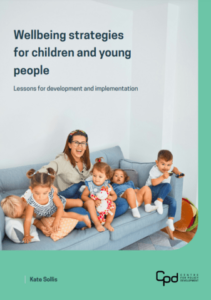 The report draws on insights of successfully implemented child and youth wellbeing strategies – offering lessons to strengthen policy and ensure more effective approaches to improve wellbeing in children and young people. It identifies three key ways that strategies have improved government ways of working and offers three recommendations for how government policy can enhance child and youth wellbeing.
The report draws on insights of successfully implemented child and youth wellbeing strategies – offering lessons to strengthen policy and ensure more effective approaches to improve wellbeing in children and young people. It identifies three key ways that strategies have improved government ways of working and offers three recommendations for how government policy can enhance child and youth wellbeing.
Want to submit something to the FRSA eBulletin?
If you have an news item or event that you would like to be featured in a future eBulletin please submit your announcement via the form below or email communications@frsa.org.au with the subject “FRSA eBulletin submission”.
Please note FRSA members receive priority for items posted in the eBulletin. And to keep information current, relevant and useful, submissions will not be repeated from week to week.
Subscribe
Subscribe to receive future eBulletin editions directly to your inbox!










